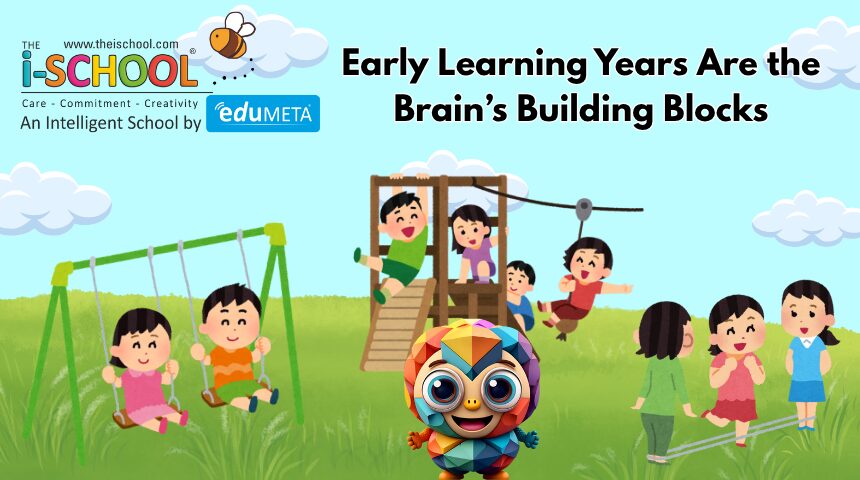Why Early Learning Years Are the Brain’s Building Blocks

In the world of early childhood education, one truth stands tall: the early years are not just important, they are foundational. From birth to age six, a child’s brain is developing at a pace faster than it ever will again. These years are a golden window of opportunity where every sound heard, every emotion felt, and every discovery made shapes the architecture of the brain.
At eduMETA THE i-SCHOOL, we believe in unlocking this potential with care, creativity, and a curriculum rooted in science.
The Science Behind Early Brain Development
Research shows that by age 3, a child’s brain has already developed 80% of its adult size. By age 5, it’s about 90%. This means the early years are not just preparation for learning – they are the most important years for learning.
In these formative years, children are:
- Building neural connections at lightning speed.
- Developing emotional intelligence through social interactions.
- Strengthening cognitive skills through play, repetition, and routine.
In essence, every activity from stacking blocks to singing rhymes, is laying the wiring for how they think, feel, and learn later in life.
Why Preschool Matters More Than You Think
High-quality preschool education doesn’t just teach children letters or numbers it equips them with the tools to thrive:
Language Development: Exposure to phonics, stories, and conversation shapes vocabulary and communication skills.
Social Skills: Children learn to share, express, wait their turn, and empathize essential life skills that no gadget can teach.
Motor Skills & Coordination: Cutting paper, drawing lines, hopping, climbing these seemingly simple activities are brain boosters in disguise.
Problem-Solving Abilities: Through puzzles, games, and play-based learning, children develop logic and creative thinking.
At eduMETA THE i-SCHOOL, our age-appropriate modules are designed to stimulate the senses, ignite curiosity, and build strong cognitive pathways all in a nurturing, playful environment.
The Role of Parents and Educators: Co-Architects of the Brain
You don’t need to be a neuroscientist to shape your child’s brain. You just need to be present, intentional, and supportive. Both educators and parents have a role to play:
Talk to children constantly. Conversations build language and memory.
Read aloud every day. Books spark imagination and comprehension.
Let them play freely. Play is the brain’s favorite way to learn.
Be responsive. Love and attention are the nutrients of brain growth.
Laying Foundations for Life
At eduMETA THE i-SCHOOL, we treat each child as a seed full of potential. Our classrooms are more than spaces; they are neural playgrounds, where young minds are nurtured through structured learning, free play, discovery, and affection.
We don’t just prepare children for primary school.
We prepare their brains and their hearts for life.
Final Thoughts
The early years are not a waiting room for “real” learning they are the real deal. What happens in a child’s brain between 0 to 6 years shapes the rest of their lives. As educators, parents, and society at large, investing in early childhood education isn’t just wise it’s essential.
Because when we build a strong foundation, the sky is the limit.
